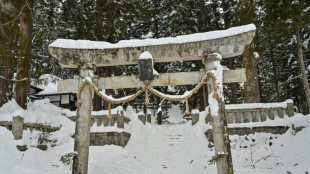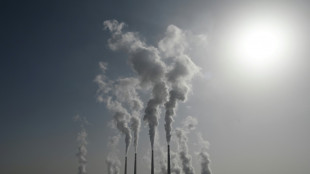
-
 Indonesia launches new multi-billion-dollar sovereign wealth fund
Indonesia launches new multi-billion-dollar sovereign wealth fund
-
South Korean fans soak up nostalgia with vintage Japanese superheroes

-
 Most Asian markets track Wall St loss; Hong Kong extends gains
Most Asian markets track Wall St loss; Hong Kong extends gains
-
German vote winner Merz faces tough talks to build govt

-
 Japan warns of avalanches, icy roads ahead of more snow
Japan warns of avalanches, icy roads ahead of more snow
-
All Black Caleb Clarke admits dangerous driving: NZ media

-
 Debutants San Diego stun Galaxy with win in Los Angeles
Debutants San Diego stun Galaxy with win in Los Angeles
-
India's Modi uses mega Hindu festival to burnish credentials

-
 Surprise rebel alliance could give Sudan's beleaguered RSF a boost
Surprise rebel alliance could give Sudan's beleaguered RSF a boost
-
Three years after Russia invasion, UN faces difficult votes on Ukraine

-
 German 'rust belt' town spotlights growing appeal of the far right
German 'rust belt' town spotlights growing appeal of the far right
-
Campbell downs Potgieter in playoff for first PGA Tour title in Mexico

-
 USA and Japan win to set up SheBelieves Cup decider
USA and Japan win to set up SheBelieves Cup decider
-
Most USAID workers to be fired or placed on leave

-
 Hakimi scores twice as PSG sink Lyon to stay unbeaten in Ligue 1
Hakimi scores twice as PSG sink Lyon to stay unbeaten in Ligue 1
-
Hat trick pulls Ovechkin closer to Gretzky's NHL goals record

-
 Tanaka strikes again as Japan down Colombia
Tanaka strikes again as Japan down Colombia
-
Baker wins US indoor 60m as Kessler, Hiltz complete double

-
 Kane admits last-minute decision to make Bayern bench
Kane admits last-minute decision to make Bayern bench
-
Bakers wins US indoor 60m as Kessler, Hiltz complete double

-
 American Airlines flight lands in Rome after 'security' issue
American Airlines flight lands in Rome after 'security' issue
-
Dupont eyeing Six Nations showdown with Ireland after Italy rout

-
 Slot wary of Premier League dangers despite 'big' Man City win
Slot wary of Premier League dangers despite 'big' Man City win
-
Borthwick defiant after uninspired England edge Scotland

-
 Nations at odds over major UN climate science report
Nations at odds over major UN climate science report
-
Pakistan fans look away from India Champions Trophy 'humiliation'

-
 Global prayers as Vatican says pope still 'critical'
Global prayers as Vatican says pope still 'critical'
-
Pakistan's Rizwan admits Champions Trophy dream 'ended' by India

-
 France star Dupont eyeing Six Nations showdown with Ireland after Italy destruction
France star Dupont eyeing Six Nations showdown with Ireland after Italy destruction
-
'We need another title', says Salah after 'special' Man City win

-
 Relentless Bayern stay eight points clear
Relentless Bayern stay eight points clear
-
Kohli shuts down 'noise' with landmark century

-
 Modric stunner maintains Real Madrid title charge
Modric stunner maintains Real Madrid title charge
-
Salah-inspired Liverpool beat Man City to open up 11-point Premier League lead

-
 Townsend wants England agony to inspire Scotland for Six Nations finish
Townsend wants England agony to inspire Scotland for Six Nations finish
-
Eleven-try France destroy Italy to set up Six Nations showdown with Ireland

-
 Every game 'pressure' as Bangladesh face make-or-break clash
Every game 'pressure' as Bangladesh face make-or-break clash
-
Conservatives win German vote as far-right makes record gains

-
 Israel ready to resume Gaza war, PM warns after truce delay
Israel ready to resume Gaza war, PM warns after truce delay
-
'Captain America' slips but clings to N. America box office lead

-
 Modric hits rocket as Real Madrid beat Girona
Modric hits rocket as Real Madrid beat Girona
-
Eleven-try France hammer Italy 73-24 in Six Nations

-
 Kohli hits ton as India push Pakistan to brink of Champions Trophy exit
Kohli hits ton as India push Pakistan to brink of Champions Trophy exit
-
Zelensky offers to resign in exchange for Ukrainian NATO membership

-
 US ski star Shiffrin hits 100 to cement legendary status
US ski star Shiffrin hits 100 to cement legendary status
-
Forest felled by Isak as Newcastle bolster top four bid

-
 Man City's Haaland ruled out for Liverpool clash
Man City's Haaland ruled out for Liverpool clash
-
Referee 'corruption' accusations leave Marseille president Longoria facing punishment

-
 Van Persie returns to Feyenoord as coach
Van Persie returns to Feyenoord as coach
-
Athletic Bilbao crush Valladolid to maintain top four pace


German 'rust belt' town spotlights growing appeal of the far right
Sporting a cap with the Trump-inspired slogan "Make Duisburg Great Again", AfD candidate Alan Imamura was upbeat as he campaigned for the far-right party in Germany's ailing industrial heartland.
"In the past, lots of people looked at us strangely or even insulted us -- that's hardly been the case this year," said the 51-year-old in the working class district of Duisburg North, as passing cars tooted horns in support.
The city in Germany's western Ruhr region highlights how the far right has made progress beyond its traditional strongholds in Germany's ex-communist east, helping propel the AfD to a record nationwide result in Sunday's elections.
Duisburg is a steel town and traditional symbol of Germany's industrial might, and Duisburg North has long been a stronghold of the Social Democrats (SPD) of Chancellor Olaf Scholz.
But, as the city went into industrial decline, so the political landscape has shifted, with many SPD voters saying they no longer feel represented by the party.
The upheaval was clear as election results rolled in late Sunday.
According to a nearly complete vote count, the AfD more than doubled its share in Duisburg North from the last elections in 2021, hitting over 24 percent, just slightly behind the SPD, which shed around 10 points.
- 'Mood is bad' -
Ludger Schulppen, a former SPD member who switched to backing the AfD, said the city is struggling with a growing number of migrants that it cannot support.
"So many companies are closing, it's just not possible for people to come and just go and work," the 63-year-old told AFP.
He works for steel titan Thyssenkrupp, which last year announced it was cutting 11,000 jobs in the face of rising Asian competition.
"The mood is bad," Schulppen said. "Nobody knows who's affected, which departments are affected, what comes next."
Tax cuts and environmental deregulation backed by the AfD would help his industry, he argued.
Duisburg has a long history of welcoming newcomers, particularly after World War II when workers from Turkey and Italy arrived and helped power the country's "economic miracle".
Nowadays 58.3 percent of school children in Duisburg are migrants or the children of migrants, according to official data.
But, 10 years after Middle Eastern migrants began arriving in large numbers under former chancellor Angela Merkel, attitudes have hardened in the face of high-profile attacks and problems with integration.
"The people who come here are not people who have good jobs in their own countries," said Schulppen.
"They're people who come for the benefits on offer. I have plenty of Turkish colleagues who point out that they got nothing when they came over, they just came and worked."
The AfD's growing appeal highlights how the far-right party is making progress in western Germany.
Its advances were clear at Sunday's elections, with the party roughly doubling its support nationwide to around 20 percent.
They came in second to the centre-right CDU, whose leader Friedrich Merz is set to become the next chancellor -- although he insists he won't involve the far right in coalition talks, despite relying on their support for a parliamentary vote in January.
- 'Can't go on like this' -
Duisburg has seen better days. Just 500,000 people call the city home, down from almost 600,000 in the mid-1970s.
Outside the town centre, abandoned buildings dot the cityscape.
On a housing estate nicknamed the "White Giants" -- which hit the headlines last year after postal firm DHL suspended deliveries there, citing threats to its staff -- cleaner Manuela Spitzwieser said she has shifted to supporting the AfD from the SPD.
The 54-year-old complained some residents "break everything and go on rampages," and throw rubbish from the upper floors of tower blocks, pointing to the rubbish-strewn playground.
Most Germans in her circle were AfD supporters, she said, but insisted it was "not about chucking foreigners out".
"It's about deporting criminals. Deporting illegal migrants. Things can't go on like this."
F.Müller--BTB
